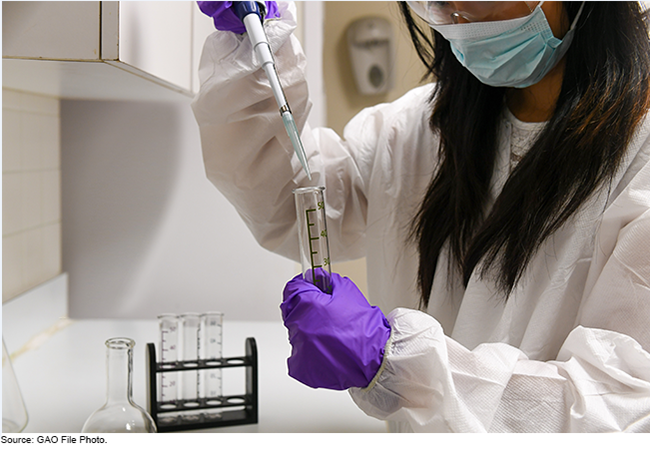Scientific Integrity: HHS Agencies Need to Develop Procedures and Train Staff on Reporting and Addressing Political Interference
Fast Facts
Public health agencies regularly use scientific methods and evidence to inform decisions. How do they protect scientific decision-making from interference for political purposes?
We testified that the policies and procedures for ensuring scientific integrity at 4 agencies we reviewed do not define political interference or describe how it should be reported and addressed.
Employees said they observed potential political interference but didn't report it because they:
- feared retaliation
- were unsure how to report issues
- believed agency leaders were already aware
Our recommendations would help the agencies better protect scientific integrity.

Highlights
What GAO Found
In its April 2022 report, GAO found that the four selected agencies it reviewed did not have procedures describing how political interference in scientific decision-making should be reported and addressed. These agencies within the Department of Health and Human Services (HHS) are: the Centers for Disease Control and Prevention (CDC), Food and Drug Administration (FDA), the National Institutes of Health (NIH), and the Office of the Assistant Secretary for Preparedness and Response (ASPR).
The absence of specific procedures may explain why the four selected agencies did not identify any formally reported internal allegations of potential political interference in scientific decision-making from 2010 through 2021. Through semi-structured interviews and a confidential hotline, employees at CDC, FDA, and NIH told GAO they observed incidents that they perceived to be political interference but did not report them for various reasons. These reasons included, being unsure how to report issues, believing agency leaders were already aware, and fearing retaliation.
All four selected agencies—CDC, FDA, NIH, and ASPR—train staff on some scientific integrity-related topics, such as public health ethics, but only NIH includes information on political interference in scientific decision-making as part of its training.
Why GAO Did This Study
Since 2007, Congress and multiple administrations have taken actions to help ensure that federal science agencies have scientific integrity policies and procedures in place that, among other things, protect against the suppression or alteration of scientific findings for political purposes. GAO defined scientific integrity as the use of scientific evidence and data to make policy decisions that are based on established scientific methods and processes, are not inappropriately influenced by political considerations, and are shared with the public when appropriate.
This testimony summarizes GAO's April 2022 report on scientific integrity (GAO-22-104613). That report examined the procedures in place at CDC, FDA, NIH, and ASPR to address allegations of political interference in scientific decision-making and the extent to which agencies received such allegations. It also examined training provided by the selected agencies on scientific integrity policies and procedures, including those related to political interference. GAO analyzed the agencies' scientific integrity policies, procedures, and trainings; interviewed agency officials, and employees, which included managers and non-managers; and deployed a confidential hotline.
Recommendations
In its April 2022 report, GAO made seven recommendations to CDC, FDA, NIH, and HHS, including that they develop procedures for reporting and addressing allegations of political interference and train staff on how to report such allegations. HHS concurred with the recommendations and noted planned actions to implement the recommendations.
